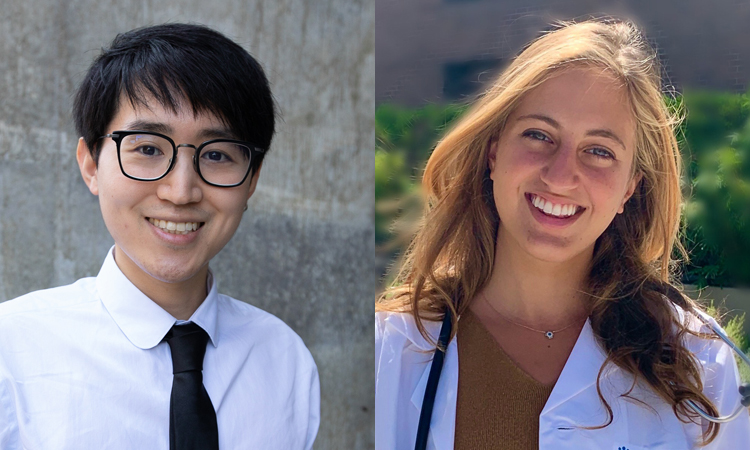The Merkin Institute for Translational Research at Caltech has awarded grants to two Kaiser Permanente Bernard J. Tyson School of Medicine students to pursue independent research projects.
Adrian Bahn and Rana Eser, both currently studying at California Institute of Technology (Caltech) under the two schools’ joint MD-PhD degree program, are among the recipients of the Merkin Spark Grants program for 2024. The program awards students with up to $10,000 each to explore translational research, which utilizes discoveries in the sciences to solve unmet medical needs and pursue lifesaving solutions for the medical profession and patients.
“I am quite grateful for the opportunity to work on translational projects such as this,” said Eser, whose grant was awarded based on her project, “Increasing the Safety and Reach of Gene Therapies by Reducing the Immunogenicity of Adeno-Associated Viruses (AAVs) with Mechanism/Computation-Informed Directed Evolution in Human Tonsil Organoids,” on which she is partnering with a fellow Caltech graduate student.
“Bringing the amazing science being done at Caltech into the clinical setting is something I and my fellow MD-PhD candidates are quite passionate about,” Eser said. “Safety in humans is one of the most basic requirements for the clinical application of therapeutics, and as AAVs are such a promising and widely applicable tool for gene therapy, I believe it's important we prioritize projects aimed at improving their safety in humans. Supporting translational work such as this project and the others funded by the Merkin Institute at Caltech is extremely important, as this is what will end up changing lives for countless patients.”
AAVs are small, non-harmful viruses that have become the leading candidate for gene therapy. However, while preclinical studies have shown promise, immunogenicity seems to cause issues when translating AAV gene therapy into clinical practice. Through their study, Eser and her partner aim to leverage recent advances in human tonsil organoids – an artificially grown mass of cells or tissue that resembles an organ – to increase both the efficacy and safety of AAV gene therapy for clinical application.
Bahn’s grant was awarded based on his project, “Design of Human Cytomegalovirus Receptor Inhibitors.” Cytomegalovirus, more commonly known as CMV, is a common virus that is particularly damaging to pregnant women and infants, causing birth defects from blindness to brain infection. At this point, there is no cure but only treatments for CMV, which remains dormant in the body for the entirety of a patient’s life. Through his research, Bahn plans to lay the foundation for new CMV biologic drugs that can cross the placenta and are likely resistant to viral mutational escape.
“We are indeed very proud that Adrian and Rana were awarded Spark grants,” said Jose M. Barral Sanchez, MD, PhD, Chair of Biomedical Science and Co-Director of the KPSOM-Caltech MD-PhD Program. “These awards truly recognize their talents as independent thinkers. As both Rana and Adrian are participating in KPSOM’s collaborative MD-PhD program with Caltech, this speaks volumes about the quality of our program and its solidity going forward.”
Spark Grants projects are conceived and driven by graduate students, with novel applications of methods and variations across labs being highly encouraged. The grants are currently only awarded to post-rotation MD-PhD student members of Caltech. Student applicants required to describe their project and to share how distinct the project is from the ongoing research of the host lab.



